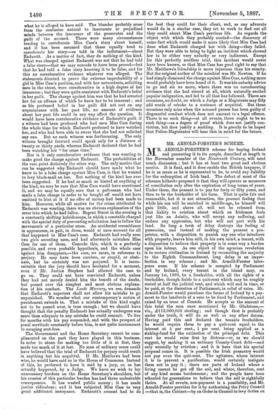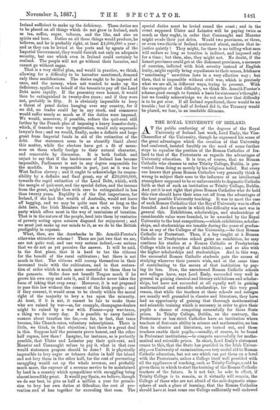MR. ARNOLD-FORSTER'S SCHEME.
MR. ARNOLD-POINTER'S scheme for buying Ireland and presenting it to its people, described at length in the November number of the _Nineteenth Century, will need much discussion ; but it has at least two great and obvious merits. It is final, and it does enable the British taxpayer, if he is as mean as he is represented to be, to avoid any liability for the redemption of Irish land. The defect of most of the schemes hitherto proposed is that they will operate as measures of conciliation only after the expiration of long terms of years. Under them, the peasant is to pay for forty or fifty years, and then to be the freeholder of his farm. That is quite fair and reasonable, but it is not attractive, the peasant feeling that while his son will be enriched in middle-age, lie himself will gain little, and above all, will not be released from that liabity to eviction about which an Irishman feels just like an Asiatic, who will accept any suffering, and endure any oppression, but who will not part with his land. So long a terdt of delay destroys the feeling of possession, and instead of making the peasant a pro- prietor, with a disposition to punish any one who interferes with property, leaves him still, in his own mind, Si tenant, with a disposition to believe that property is in some way a burden upon his labour. As one object of the agrarian revolution is to restore civilisation in Ireland by reconciling the majority to the Eighth Commandment, long delay is an imper- fection in any scheme ; and Mr. Arnold-Forster inter- poses none. If his scheme is accepted by Parliament and by Ireland, every tenant in the island may, on January 1st, 1889, be a freeholder, with all the rights of a freeholder, though liable to a quit-rent which may be roughly stated at half the judicial rent, and which will end in time, or be paid, at the discretion of Parliament, in relief of rates. Mr. Arnold-Forster would purchase the farms of Ireland by a pay- ment to the landlords of a sum to be fixed by Parliament, and raised by an issue of Console. He accepts as the amount of this total the sum once mentioned by Mr. Gladstone,— viz., £113,000,000 sterling ; and though that is probably under the truth, it will do as well as any other datum. Having paid this and declared the tenants freeholders, he would require them to pay a quit-rent equal to the interest at 4 per cent., 1 per cent. being applied as a sinking-fund for the extinction of the principal debt. This rent he would raise first by distress—or, as we should suggest, by making it an ordinary County-Court debt—and only secondly by eviction ; and it is here that his special proposal comes in. It is possible the Irish peasantry would not pay even the quit-rent. The agitators, whose interest it is to prevent a pacification, would certainly instigate them not to pay it ; there are parts of Ireland where a living cannot be got off the soil, and where, therefore, rent of any kind seems burdensome ; and the people have been schooled for generations to believe that the soil is rightfully theirs. At all events, non-payment is a possibility, and Mr. Arnold-Forster provides for it by authorising the Privy Council —that is, the Cabinet—by an Order in Council to levy duties on
Ireland sufficient to make up the deficiency. These duties are to be placed on all things which do not grow in Ireland, such as tea, coffee, sugar, tobacco, and the like, and also on spirits and beer. Duties on all these things would produce, he believes, and he is probably right, at least £4,000,000 a year ; and as they can be levied at the ports and by agents of the Imperial Government, they would furnish not only an adequate security, but one which even in Ireland could certainly be realised. The people will not go without their luxuries, and cannot go without sugar. That is a very skilful plan, and would in practice, we think, allowing for a difficulty to be hereafter mentioned, demand only these modifications. The duties ought to be imposed at once, and the money, when not wanted to make up the deficiency, applied on behalf of the tenants to pay off the Land Debt more rapidly. If the peasantry were honest, it would then be extinguished in twenty-five years ; and if they were not, probably in fifty. It is obviously impossible to keep a threat of penal duties hanging over any country, for if we did, no trader could lay in any stock, and commerce would suffer nearly as much as if the duties were imposed. We would, moreover, if possible, reduce the quit-rent still farther by the French plan of imposing a heavy transfer-duty, which, if transfer were by registration, would only supersede lawyer's fees ; and we would, finally, make a definite and large grant from Imperial funds in aid of the extinction of the debt. Our statesmen seem to us absurdly timid about this matter, while the electors have got a fit of mean- ness on them wholly foreign to their natural character, and removable by discussion. It is both foolish and unjust to say that if the land-tenure of Ireland has become impossible, Parliament is not in any degree responsible for the muddle. It is responsible in part, just as it was for West Indian slavery ; and it ought to acknowledge its respon- sibility by a definite and final grant, say of £20,000,000, towards the rapid extinction of the Land Debt, which, with the margin of quit-rent, and the special duties, and the income from the grant, might then with care be extinguished in less than twenty years. Rapidity is of the first importance, for Ireland, if she had the wealth of Australia, would not leave off begging, and we may be quite sure that so long as the debt lasts, the Irish Members will, as a rule, vote for the party which offers most in the way of remissions of taxation. That is in the nature of the people, bred into them by centuries of poverty acting upon natures disposed for enjoyment ; and we must jest make up our minds to it, as we do to the British prodigality in expense.
What, then, are the drawbacks to Mr. Arnold-Forster's otherwise attractive scheme ? There are just two that we see, one not quite real, and one very serious indeed,—so serious that we do not as yet perceive the answer. It will be said, in the first place, that it is hard to tax the citizens for the benefit of the rural cultivators ; but there is not much in that. The citizens will recoup themselves in their increased trade with the cultivators, and in that restora- tion of order which is much more essential to them than to the peasants. Order does not benefit Teague much if he grows his own crop and eats it, and if disorder never takes the form of taking that crop away. Moreover, it is not proposed to pass this law without the consent of the Irish people ; and if they consent, it would seem to be clearly within the moral right of the majority to levy a tax upon the minority. At least, if it is not, it cannot be fair to make those who are ruined by war—as, for example, champagne-dealers might be ruined by a war with France—pay war-taxes, a thing we do every day. It is possible to carry fastidi- ousness about taxation too far,--so far, in fact, that taxes become, like Church-rates, voluntary subscriptions. There is little, we think, in that objection ; but there is a great deal in this. Suppose half the peasants prove honest, and the other half rogues, how then ? Imagine, for instance, as is perfectly possible, that Ulster and Leinster pay their quit-rent, and Munster and Connaught refuse to pay it, what in that case would statesmen propose should be done ? It is physically impossible to levy sugar or tobacco duties in half the island and not levy them in the other half, for the cost of preventing smuggling would eat up the whole revenue, and probably much more, the expense of a revenue service to be maintained by land in a country which sympathises with smuggling being almost incredibly great. It would pay Spain, we believe, though we do our best, to give us half a million a year for permis- sion to levy her own duties at Gibraltar, the cost of pre- vention and of loss together far exceeding that sum. The special duties must be levied round the coast ; and in the event supposed Ulster and Leinster will be paying twice as much as they ought, in order that Connaught and Munster might evade their just debts. Would two provinces, or three, or even two-thirds of Ireland scattered about, endure that in- justice quietly ? They might, for there is no telling what men will endure so long as taxation is indirect, and imposed only for a time ; but then, also, they might not. No doubt, if the honest provinces could get at the dishonest provinces, a measure of coercion, inflicted with Irish severity instead of English lenity, might rapidly bring repudiators to their senses, Irishmen "sanctioning " unwritten laws in a very effective way ; but then, that is impossible without civil war, which is precisely what we are all, in different ways, trying to prevent. With the exception of that difficulty, we think Mr. Arnold-Forster's scheme good enough to furnish a basis for statesmen's thought ; but we frankly acknowledge we do not see how that difficulty is to be got over. If all Ireland repudiated, there would be no trouble ; but if only half of Ireland did it, the Treasury would be placed, we fear, in an insoluble dilemma.



















































 Previous page
Previous page